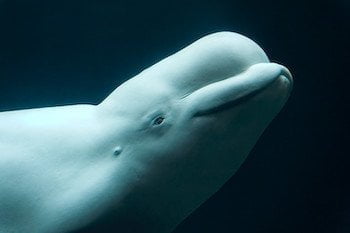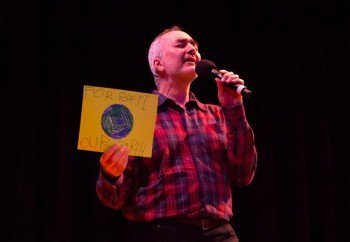From CommonDreams
If you were born in the 1970s, 1980s, or 1990s in the United States or Canada, there’s a good chance you are familiar with the song “Baby Beluga.” The song, which is about a young whale swimming in the ocean with its mother, was written by Raffi Cavoukian, a Canadian singer-lyricist who was once called “the most popular children’s singer in the English-speaking world.” Raffi’s hits include “Down by the Bay,” “Thanks A Lot,” “Must Be Santa,” and “The More We Get Together.”
“Baby Beluga” was inspired by a captive beluga whale named Kavna at the Vancouver Aquarium. But the song itself – which has been covered by groups ranging from the rock band Pearl Jam to country singer Billy Gilman – has gone on to inspire many children to take an interest in nature and wildlife.
“Baby Beluga’s ability to move people who hear it still amazes me,” Raffi told Mongabay in a November 2020 interview. “Not only is it still a kids’ favorite, adults who’ve grown up with it — beluga grads — now number in the tens of millions in Canada and the U.S.”
“Baby Beluga” was a big hit, but Raffi turned down lucrative opportunities to commercialize the song and turn it into a franchise, including declining a film offer because its marketing would have involved direct advertising to children. Decisions like that reflect Raffi’s deeper concern about the well-being of children, which extends to the environment upon which they depend.
In the 40 years since “Baby Beluga” was released, Raffi has developed a comprehensive philosophy on how to create a “humane and sustainable world by addressing the universal needs of children.” This philosophy is at the heart of the Raffi Foundation for Child Honouring, a nonprofit charitable organization that runs several educational initiatives, including courses and a set of “principles for healthy living.”
Four of the nine principles touch on nature and ecological sustainability: “Diversity,” which includes appreciating biodiversity and cultural diversity; “Safe Environments,” which includes consideration of toxic chemicals, among other issues; “Sustainability,” which includes conservation, renewable energy, and anti-pollution measures; and “Ethical Commerce,” which includes “triple bottom line” business, full-cost accounting, tax and subsidy shifts, and encouraging political and economic cycles that reward long-term thinking to create a restorative economy. Raffi’s own company, Troubadour Music Inc., is a triple-bottom-line company.
“Child Honouring’s holistic ‘Respecting Earth and Child’ vision, compels us to take a big picture look at the environments in the ecology of the child,” Raffi said. “That includes what we call the economy and how people and nations bring goods to market, farmers and the quality of soil and produce, the quality and safety of what we offer our young.“
Most of Raffi’s focus these days are efforts to further the concept of “Child Honouring” and everything that goes along with it. He continues to use music as an instrument to inspire, including releasing songs on environmental advocacy. For example, “Cool It” (2017) called attention to climate change, while “Young People Marching” (2019) served as a tribute to young climate activist Greta Thunberg.
“Music like this can provide teachable moments for teachers and students, parents and kids,” Raffi told Mongabay. “Such songs can inspire and support not only climate strikers but all of us who want the best for our children — a desire in which families are united. The climate threat affects the whole world and all peoples.”
Raffi discussed these issues and more during an interview with Mongabay Founder Rhett A. Butler.
AN INTERVIEW WITH RAFFI
Rhett A. Butler for Mongabay: “Baby Beluga” has driven interest in animals and the environment among multiple generations of children now. Is that something you would have ever expected when you wrote the song?
Raffi Cavoukian: “Baby Beluga’s” ability to move people who hear it still amazes me. Not only is it still a kids’ favorite, adults who’ve grown up with it — beluga grads — now number in the tens of millions in Canada and the U.S. Quite a mighty pod.
We live in an increasingly urbanized world, where more than half of children grow up in cities, often with little access to open, natural spaces. What kinds of things can parents and educators do to help urban children grow up with love and appreciation for nature?
 Spend as much time outdoors as possible. Go to your preferred urban parks and, when you can, go out of the city to nature trails, forests, streams and lakes, and of course beaches. Kids love beach treasure hunts.
Spend as much time outdoors as possible. Go to your preferred urban parks and, when you can, go out of the city to nature trails, forests, streams and lakes, and of course beaches. Kids love beach treasure hunts.
You’ve released music with strong advocacy themes, including “Cool It” with Dr. David Suzuki about climate change and “Earth Songs” to mark the 50th anniversary of Earth Day. Do you see music as a way to bridge some of the current divisiveness in society to bring people together?
My 2007 song “Cool It” and the 2019 song “Young People Marching” address the climate emergency and the need for our children to have a livable future, to contain and reverse global warming. Music like this can provide teachable moments for teachers and students, parents and kids. Such songs can inspire and support not only climate strikers but all of us who want the best for our children—a desire in which families are united. The climate threat affects the whole world and all peoples.
In 2013, you published the book, “Lightweb Darkweb: Three Reasons to Reform Social Media Before it Re-forms Us“, which was ahead of its time in terms of warning about the downsides of the internet and social media. In the seven years that followed, social media has worsened divisiveness by poisoning civil discourse, exacerbated violence and hate speech against activists and marginalized groups, upended democracies, blunted peoples’ ability to discern fact from fiction, and arguably been detrimental to the mental health of many. Did you think it would get this bad? And how can we reset our relationship with these platforms?
SCROLL TO CONTINUE WITH CONTENT
Never Miss a Beat.
Get our best delivered to your inbox.
Parents still have the responsibility of their kids staying off social media until they’re mature enough to engage safely, especially now that there are so many “bad actors” online who prey on the vulnerable.
We must guard personal privacy, both at home and in work spaces, and also in calling for privacy to be the default in tech devices.
Liberty and privacy go together. When we protect individual privacy, we are also defending democracy. We do need stronger legislation to keep hate groups off social media. That goes for abusive ads as well.
What was your inspiration for the concept of “Child Honouring”?
Child Honouring is a philosophy that came to me in a vision in 1997, after which I wrote A Covenant For Honouring Children and outlined nine principles for conscious living. Child Honouring is a global credo for maximizing joy and reducing suffering by respecting of every child at the start of life, with benefits rippling in all directions. How we treat and regard the very young and their universal formative needs is the key to a lifetime of outcomes, positive and negative. As caregivers to our young, we are called to ensure their first impressions of life are positive and life-affirming. That’s an investment that yields tremendous and lasting benefits.
Your covenant and nine principles for healthy living are impressively encompassing, even including full cost accounting, eliminating perverse subsidies, and building “a restorative economy devoted to the well-being of the very young.” What was your process for developing these? And how are they being received by the public?
 In the 1990s, I embraced a self-designed learning process about how the systemic aspects of a society affect individuals and our primary learners, children.
In the 1990s, I embraced a self-designed learning process about how the systemic aspects of a society affect individuals and our primary learners, children.
Child Honouring’s holistic “Respecting Earth and Child” vision, compels us to take a big picture look at the environments in the ecology of the child. That includes what we call the economy and how people and nations bring goods to market, farmers and the quality of soil and produce, the quality and safety of what we offer our young.
I’m glad to have read the books and had conversations with many systems thinkers in a number of disciplines.
The Raffi Foundation’s online course in Child Honouring offers an interdisciplinary path to conscious living. The course gets raves from parents and educators who take it.
How can people get involved with the foundation and its mission?
We have a small board of directors and a much larger Advisory Council.
At raffifoundation.org people can learn about the people and partnerships that support the foundation’s educational mission: to advance Child Honouring as a universal ethic.
What would you say to young people who are distressed about the current trajectory of the planet?
Crisis brings opportunity. When systems break down, better systems that are aligned with Nature’s wisdom and human needs can flourish. An “Earth and Child” approach to economy, governance and social justice are here for our embrace.
My foundation’s online course offers an in-depth experience to move us to be the positive changemakers our kids need and can be proud of. The work, as always, is about our innate love and how we live that love.
Leave a Reply
You must be logged in to post a comment.